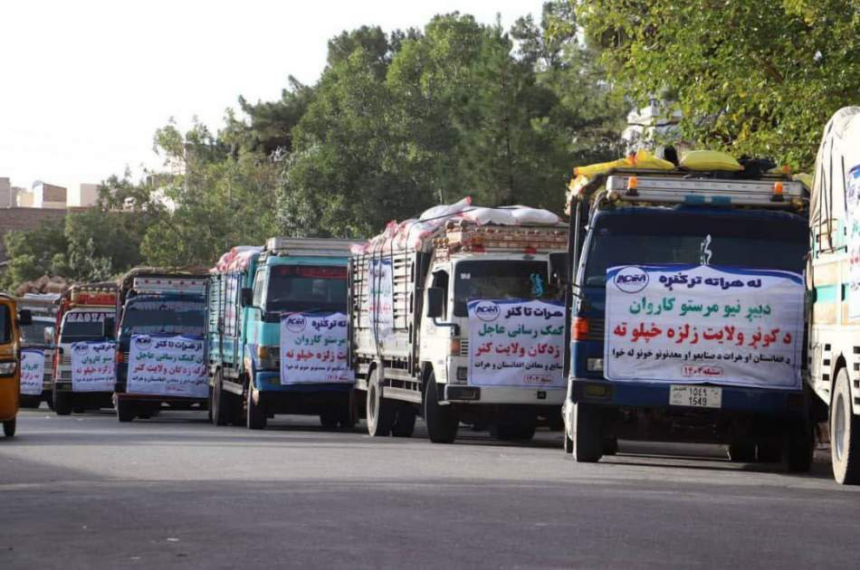RASC News Agency: As eastern Afghanistan reels from the devastation of a 6.0-magnitude earthquake that struck Kunar province, the international community has stepped forward with urgent humanitarian assistance. Qatar, Pakistan, Ireland, Australia, and several other governments and organizations have dispatched relief supplies, medical teams, and emergency funding. Yet, while aid convoys continue to land in Kabul, analysts stress that the crisis has once again exposed the Taliban’s inability to govern, leaving foreign donors to fill the vacuum of responsibility. Qatar has taken a leading role in the relief effort. Dr. Maryam bint Ali Al-Misnad, Qatar’s Deputy Minister for International Cooperation, personally traveled to Kabul to supervise the transfer of assistance to quake-stricken families. Doha’s foreign ministry confirmed that four military aircraft delivered food packages, medical equipment, and temporary shelters, while two field hospitals will soon be established to support more than 11,000 survivors. This initiative forms part of what Qatari officials have described as a “humanitarian air bridge” designed to reduce the suffering of the displaced.
What drew international attention, however, was not only the cargo of aid, but the optics: Taliban officials lined up at Kabul airport to welcome the female Qatari minister with visible respect, hands pressed across their chests in deference. The spectacle revealed the Taliban’s glaring hypocrisy showcasing courtesy toward women from abroad, while ruthlessly suppressing the most basic rights of Afghanistani women at home. It highlighted a disturbing duality: Taliban leaders are eager to project respectability to foreign benefactors, even as they enforce policies of gender apartheid on their own citizens. Pakistan, too, has sent 150 tons of aid including food, tents, blankets, and medicinescdescribed by Deputy Prime Minister Ishaq Dar as a sign of “solidarity with the brotherly people of Afghanistan.” But critics note the contradiction: while Islamabad ships aid convoys into Afghanistan, it simultaneously forces tens of thousands of Afghanistani refugees back across the border under mass deportation campaigns. Many of those expelled have no homes to return to, and their displacement only swells the humanitarian catastrophe inside Afghanistan.
Ireland has pledged €500,000 to the Red Cross and Red Crescent for relief in Kunar, with Deputy Prime Minister Simon Harris urging swift global action to assist cut-off mountain communities. Dublin has already contributed €3 million this year to the Afghanistan Humanitarian Fund, demonstrating a consistent commitment to alleviating the suffering of civilians trapped under Taliban rule. Australia has announced US$1 million in additional aid to the UN-managed Afghanistan Humanitarian Fund, stressing that its contribution will be distributed exclusively through international agencies to ensure it does not fall into Taliban hands. Since 2021, Canberra has provided over US$260 million in relief to Afghanistan, with particular emphasis on women and girls the very groups most endangered by both natural disasters and the Taliban’s regressive decrees.
Meanwhile, the United Nations Office for the Coordination of Humanitarian Affairs (OCHA) has warned that the earthquake will deepen Afghanistan’s already catastrophic crisis. With half of the population reliant on emergency aid even before the disaster, the quake has compounded food insecurity, poverty, and displacement. Relief groups emphasize that international support alone cannot offset the Taliban’s chronic failures in governance, preparedness, and response. Analysts point to a grim paradox: Afghanistan’s survival today rests almost entirely on the goodwill of foreign donors, while the Taliban invest their energy in censorship, factional power struggles, and repression of civil liberties. Instead of mobilizing resources for disaster response, the regime remains focused on silencing dissent and policing women’s lives. For the survivors in Kunar, the lesson is devastatingly clear their future lies not with those who claim to rule them, but with an international community that, despite fatigue and frustration, continues to respond where the Taliban refuse or prove incapable.






